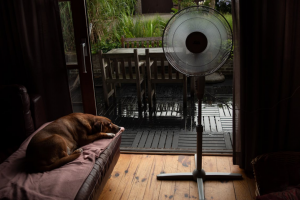6 Surprising Health Benefits of Sleeping in a Cold Room — And Why a Fan Might Not Be Your Best Friend
When summer heat strikes, many people reach for the fan to stay cool at night. But while a fan can offer quick relief, it may not always be the healthiest solution.

According to sleep experts and health researchers, sleeping in a cooler room—not necessarily with a fan—can do wonders for your body and mind. In fact, cooling down your sleep environment could be the easiest way to improve your sleep quality, metabolism, and even skin health.
Let’s explore the science-backed health benefits of sleeping in a cool room, along with tips on how to achieve it—and the risks of relying too heavily on that buzzing bedside fan.
Why You May Want to Skip the Fan at Night
Fans can be helpful, but they come with downsides. According to The Sleep Advisor and other trusted sources, here are four reasons why fans might not be ideal during sleep:
1. Worsened Allergies
Fans circulate air—but also dust, pollen, and other allergens. If you suffer from asthma or seasonal allergies, a fan can trigger symptoms like sneezing, itchy eyes, and nighttime congestion.
Regularly cleaning your fan and room can help, but it’s still a concern for sensitive individuals.
2. Dry Skin, Eyes, and Mouth
The constant airflow can dehydrate your skin and mucous membranes. If you sleep with your mouth or eyes slightly open, you may wake up with dry lips, scratchy eyes, or a parched throat.
Keep a glass of water nearby and consider using a humidifier or sleep mask if needed.
3. Sinus Trouble
Cool air directed at your face can dry out your sinuses, leading to irritation, congestion, and even sinus headaches. Prolonged exposure can result in an overproduction of mucus, leaving you feeling stuffy rather than refreshed.
4. Muscle Stiffness
Sleeping in the direct path of a fan can lead to stiff necks, sore shoulders, or muscle cramps by morning. This is especially true if the airflow is cold and consistent throughout the night.
Why a Cold Room Can Actually Improve Your Health
Instead of relying on fans, science suggests it’s better to lower your room’s temperature naturally.
Here’s how a cooler sleeping environment can benefit your overall well-being:
✅ 1. Better Sleep and Less Insomnia
Your body naturally cools down at night to prepare for rest. A room temperature between 60–67°F (15–19°C) helps trigger this process.
Cooler conditions promote deeper, uninterrupted sleep by helping your body stay in sync with its circadian rhythm.
✅ 2. Faster Metabolism & Weight Loss Support
According to a study by the National Institutes of Health, people who sleep in colder environments burn more calories. Cooler temperatures stimulate brown fat, a type of fat that helps regulate body heat and burns energy—leading to improved metabolism and even reduced risk of type 2 diabetes.
✅ 3. Improved Melatonin Production
Melatonin, your body’s sleep hormone, is also an anti-aging antioxidant. It’s produced more efficiently in cooler temperatures, contributing to better skin repair, cellular health, and hormonal balance during the night.
✅ 4. Stress and Mood Regulation
A good night’s sleep in a cool room can reduce cortisol levels, helping your body handle stress better. People who sleep well also report fewer symptoms of anxiety and depression.
How to Make Your Bedroom Cooler—Without Relying on a Fan
Want to enjoy the benefits of a cool room without triggering allergies or drying out your skin? Try these simple, energy-efficient tricks:
-
🕒 Use a Programmable Thermostat: Set your bedroom to cool down automatically at night.
-
🛏️ Choose Breathable Bedding: Opt for cotton sheets and avoid synthetic fabrics that trap heat.
-
🧊 Freeze Your Pillowcases: Pop them in the freezer 30 minutes before bedtime for a refreshing chill.
-
🌬️ Open a Window Strategically: Let in cooler evening air, especially during early morning hours.
-
🦶 Stick Your Feet Out: Your feet help regulate body temperature—exposing them can naturally cool you down.
-
👕 Sleep Naked or in Light Pajamas: Reduce overheating and improve airflow to your skin.
-
🛌 Layer Blankets: Instead of one heavy cover, layer thinner blankets so you can adjust easily through the night.
The Bottom Line: Cool Room, Better Health
Sleeping in a cold room isn’t just about comfort—it’s a powerful way to enhance your sleep quality and support your health. From reducing insomnia to boosting metabolism and melatonin, cooler sleeping conditions help your body do what it was designed to do: recover, repair, and recharge.
And while fans might offer temporary relief, they aren’t the best solution for everyone. By using smarter strategies—like breathable bedding, thermostat control, and natural cooling methods—you can get better rest without sacrificing your health.
Listen to your body, adapt your environment, and wake up feeling truly refreshed. Your sleep deserves it—and so do you.
✅ Tip: Bookmark this article or share it with someone who always complains about being too hot at night. Better sleep starts with better choices.



























